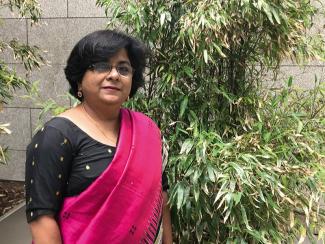KfW
Fighting chaos on the roads

The roads of Delhi are ruled by chaos. The road belongs to anyone: cars and mopeds honk in harmony as people weave carts through the traffic, surrounded by rickshaws and pedestrians looking for a gap to cross.
Jhanja Tripathy is aware of the traffic chaos in this Indian metropolis as she makes her way to the Ministry for Housing and Urban Affairs. She has been in charge of budgets and financing here for the past four years. “In a country like India with a growing population and lots of people moving to the cities, space on the roads has to be divided between a range of different road users,” she says, describing the situation. As in many other developing countries, large cities in India are fighting a rise in individual transport.
The reason behind this is actually a positive one: economic progress and rising prosperity. The growing middle classes are queuing up at car dealerships and the number of cars is rising all the time – bringing with it all the negative consequences we are already familiar with: toxic emissions, air pollution, fuel consumption, high accident rates, constant traffic jams and long waits for commuters, particularly during rush hour. “Of course, we have to convince people to do without their cars more often,” says Jhanja Tripathy, “but to do this, we need intelligent traffic management.” The individual transport systems have to be so well coordinated that people can get quickly from A to B without a car and without any long waits. This calls for integrated solutions and the increased use of IT technology.
“Public transport naturally plays a decisive role in improving the flow of traffic,” says Jhanja Tripathy.
This is why she has been working hard to promote the expansion of public transport systems for a long time. As well as working for the Ministry, she is a member of the supervisory board for five rail-based local transport companies in India. In this role, she works hard to keep pushing forward projects to expand the railway network and public transport.
For poor people especially, buses and trains remain the only form of transport, simply because they can’t afford a car and often have to travel a long way to work. And for more prosperous Indians, “use of the railway has to be so attractive that they will gladly do without their vehicle as often as possible,” explains Jhanja Tripathy.
Link
KfW supplement in D+C/E+Z:
https://www.kfw-entwicklungsbank.de/PDF/Download-Center/PDF-Dokumente-Medienkooperation-mit-E-Z/2018_10_NachhaltigeMobilität_EN.pdf
BU: Jhanja Tripathy. (KfW Bankengruppe/Michael Bäumer)








